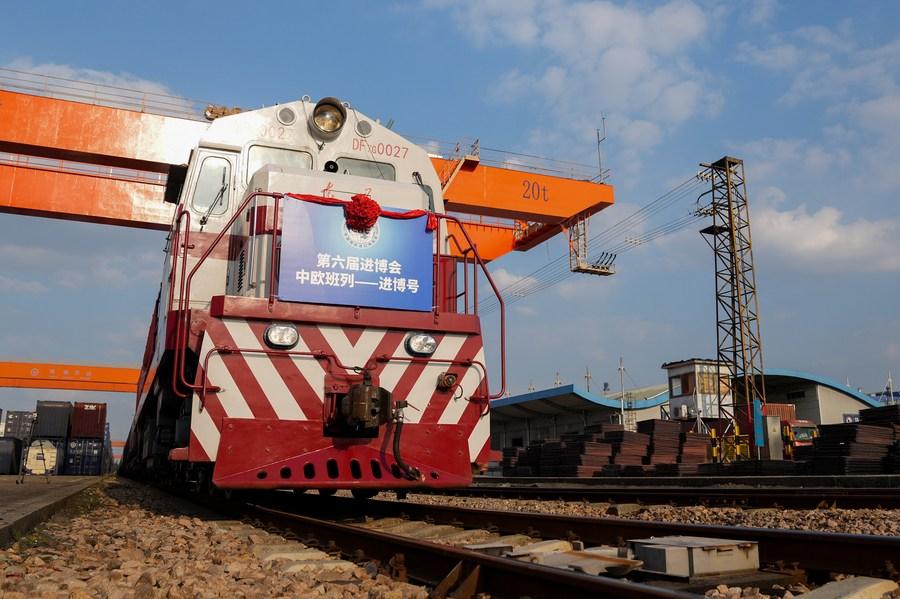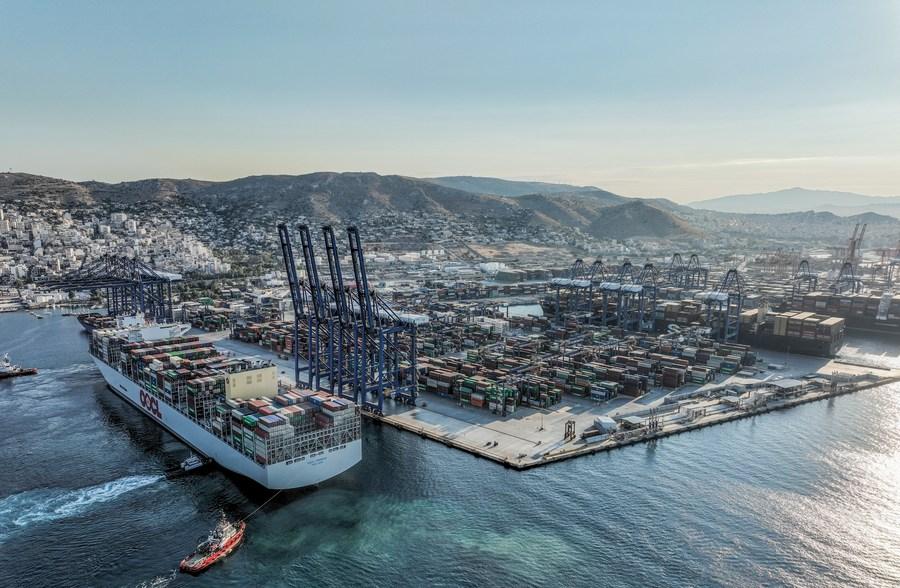
 0 Comment(s)
0 Comment(s) Print
Print E-mail Xinhua, December 10, 2023
E-mail Xinhua, December 10, 2023

A China-Europe freight train, which set out from Duisburg, Germany, carrying exhibits for the 6th China International Import Expo (CIIE) arrives in Shanghai, east China, Oct. 11, 2023. (Xinhua/Ding Ting)
Chinese President Xi Jinping on Thursday met with President of the European Council Charles Michel and President of the European Commission Ursula von der Leyen, who were in China for the 24th China-EU Summit.
Amid the increasingly turbulent international situation, China-EU relations not only hold strategic significance but also have a worldwide impact, carrying implications for global peace, stability, and prosperity.
The China-EU Summit in Beijing this time was the first in-person meeting after the pandemic, during which the two sides have reached broad consensus in various areas. It's widely believed that the face-to-face communications between the leaders from China and the EU will provide more stability to the world and inject stronger momentum into the global development.
Deepening practical cooperation
During their meeting, Xi told the EU leaders that the Chinese economy enjoys a good momentum of steady growth.
As China pursues high-quality development and high-standard opening up, it sees the EU as a key partner for economic and trade cooperation, a preferred partner for scientific and technological cooperation, and a trustworthy partner for industrial and supply chain cooperation, Xi said.
During the summit, both sides fully affirmed the success of various dialogues this year on China-EU strategic relations, the economy and trade, the environment and climate, and digital areas. They pledged to continue dialogue.
China and the EU have established more than 70 institutionalized meetings or dialogues. They are each other's second-largest trading partners, with nearly 100 million U.S. dollars worth of goods flowing between them every hour.
According to data released by the General Administration of Customs of China, the country's imports from the EU grew by 5 percent from January to November this year, reaching 1.81 trillion yuan (0.25 trillion U.S. dollars), while the trade surplus with the EU narrowed by 16.7 percent, reaching 1.41 trillion yuan.
"China is an important economic partner for European countries, and vice versa. We should always find ways to improve cooperation," said Ivo Josipovic, former president of Croatia.
During the summit, Chinese Premier Li Qiang said that China is willing to explore more models of mutually beneficial cooperation with the EU and strive to inject new momentum into bilateral relations.
"We will further expand two-way trade and investment, continue to upgrade trade and investment liberalization and facilitation, deepen green partnership, actively establish digital partnership, and enhance people-to-people exchanges," Li said.
Since Dec. 1, China has implemented a visa-free entry policy for six countries: France, Germany, Italy, the Netherlands, Spain and Malaysia.
According to the statistics released by China's National Immigration Administration, nearly 18,000 people from the six countries entered China from Dec. 1 to 3, a daily increase of 39 percent compared to Nov. 30.
Josep Maria Gomes, international business developer at the Barcelona Chamber of Commerce, was unsurprised that five of the visa-free countries are EU members.
"Spain and the other countries in the European Union have exceptionally strong links and relations with China, and in fact, their investments made in China in the past few years have just about doubled," he said.

This aerial photo taken on July 10, 2023 shows OOCL PIRAEUS, one of the largest container vessels in the world, arriving at Piraeus port, Greece. (Xinhua)
Promoting connectivity via dialogue
Xi emphasized that China will continue to promote high-quality Belt and Road cooperation, including by creating synergy between the Belt and Road Initiative (BRI) and the EU's Global Gateway to help developing countries grow faster.
The BRI envisions trade and infrastructure networks connecting Asia with Europe and Africa along the ancient Silk Road routes. At the same time, the Global Gateway plans to support infrastructure development worldwide, notably in the digital, climate and energy, transport, health, education and research sectors.
With the largest inland port in Europe, Germany's Duisburg has become an important destination for the China-Europe Railway Express, a flagship BRI enterprise, in Western Europe.
Lars Nennhaus, chief operating officer of Duisburg Port Group, said that the China-Europe Railway Express has achieved fruitful results as part of the BRI.
The China-Europe Railway Express has reached 217 cities in 25 European countries.
Data from China's railway operator showed that in the first 11 months, the China-Europe Railway Express operated 16,145 trains that transported nearly 1.75 million twenty-foot equivalent unit containers of goods, up 7 percent and 19 percent year on year, respectively.
"President Xi made a very good suggestion in aligning the Belt and Road Initiative with the EU's Global Gateway," said Hussein Askary, vice chairman of the Belt and Road Institute in Sweden. Askary said the alignment would benefit European industry and increase exports to China and the rest of the world.
During the summit, both sides also committed to openness and mutual benefits, opposed decoupling, and agreed on the need to provide a fair and non-discriminatory business environment for each other's companies.
Xi said both sides "should not view each other as rivals just because our systems are different, reduce cooperation because competition exists, or engage in confrontation because there are disagreements."
China opposes the violation of the basic norms of the market economy and opposes politicizing economic and trade issues or overstretching the concept of security, Chinese Premier Li said, encouraging the EU to keep its trade and investment markets open.
Addressing global challenges
During the summit, both sides pledged to adhere to and practice multilateralism, strengthen coordination within the United Nations and other multilateral frameworks, push for WTO reform, and work together to address global challenges such as food security, climate change, and public health.
Founder and President of the Schiller Institute, Helga Zepp-LaRouche, said: "China and Europe both have a strong interest in the stability of a multipolar system."
"If Europe decides to cooperate with China constructively, rather than viewing China as an institutional opponent, this will greatly promote the prosperity of all participating countries," she said.
Erik Solheim, former United Nations under-secretary-general and former executive director of the United Nations Environment Programme, said: "There is no doubt that if China and the EU cooperate, the handling of all major issues in our era will be much easier."
"Whether it is environmental destruction, climate change, the struggle against global poverty, the economic restart after COVID-19, or the resolution of conflicts in Ukraine, Gaza, and other areas -- in short, any problem is easier to solve with cooperation," said Solheim.
Go to Forum >>0 Comment(s)